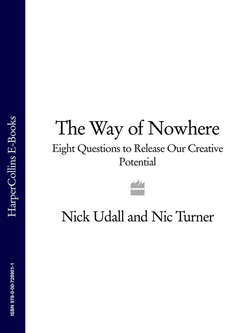Читать книгу The Way of Nowhere: Eight Questions to Release Our Creative Potential - Nick Udall - Страница 68
congruence, authenticity, discipline
Оглавлениеa Way …
Working with congruence, authenticity and discipline is one way of tapping into the co-creative power of our positive emotions whilst simultaneously intervening in the dangers and dramas of our negative emotions. Seeking to be congruent (aligning what we say with what we do), authentic (being true to ourselves and others) and disciplined (working congruently, authentically and skilfully from moment to moment) provides a great yardstick against which to measure the personal mastery of our emotions.
It begins by taking responsibility for our lives and evaluating the ‘stuff’ that has happened to us so it can be released or at least relax its hold over us. From this perspective, our dysfunctional emotional patterns can become sources of growth and self-awareness.
Let me try to describe this more fully with reference to my own life:
Maybe I was just unlucky. Most of my early teachers and bosses did not deserve to be my teacher or boss. They either did not know as much as I did or they showed some flaw that made me justifiably angry. I would spend a lot of time thinking about this and quite often I would stand up for myself and tell them just what their problem was. This led to a lot of conflict, which of course they deserved, but which caused me a lot of hurt too.
The first guy I met who broke this pattern was my English teacher, John McIntyre. When I told him his problems he just laughed and agreed with me. I did well in his lessons.
At some point in my early thirties, I started getting interested in counselling and therapy and began to focus on my relationship with my dad, who had died some years previously. He and my mum had split up when I was six and I had only seen him rarely after that. I began to realize how angry I was about how bad a dad he had been. I remember writing him a letter basically forgiving him for being a bad dad and letting go of my anger. Strange – not long after that I got my first big job and had the best boss I had ever met.
I still had loads of blow-ups with people, but I began to see them as really valuable insights into myself and I increasingly met up with people who could look at those conflicts in terms of their own growth too. It still all hurt, but I began to form a deep connection with others as we tried to work out what was happening.
I eventually found a teacher who, even by my own high standards, was incontrovertibly evolved. When I fell out with him, he asked me if I had attended my dad's funeral. I realized that I had not and at his instruction conducted my own funeral for my dad. That made me move from forgiving him to loving him for giving me the gift of life. Funny, I met Nick not long after that and helped set up nowhere.
I still fall out with people. It all still hurts. However, more often than not something good comes out of it. Every time it happens, I feel sick inside and think, ‘Oh no, here we go again.’ Yet there is another piece of me that gives thanks for it, knowing that there is still something that I need to learn and complete. Then something else will arise and the learning will go forward again.
Once we have taken responsibility for our past, it is time to take responsibility for our present and our future. Taking personal responsibility for our behaviour, and the emotions that drive our behaviour, happens when we recognize that the results we get in life are powerfully influenced by our own emotional mastery. We must call ourselves to account.
It is all too easy to fall into what is known as below the line behaviour,5 a world of blame, excuses, self-justification and denial. This is where we separate ourselves from events that are happening around us. We speak and think in the second and third person, for example you, they, he, she, it … With this stance we trap ourselves in the past.
The challenge is to step above the line and take personal responsibility for what is happening around us, recognizing that we are co-creating the results we get. This is where we take personal accountability for being in the world and commit to learning to master the world in ourselves. We speak and think in the first person: I, we me, us …
If we commit to living and working above the line, we create ever-greater degrees of congruence, authenticity and discipline, propelling ourselves and the people around us into the future with grace and elegance.
